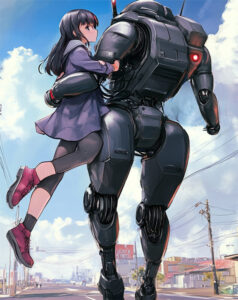 Socrates, it is claimed, was critical of writing and argued that it would weaken memory. Many centuries later, it was worried that television would “rot brains” and that calculators would destroy people’s ability to do math. More recently, computers, the internet, tablets, and smartphones were supposed to damage the minds of students. The latest worry is that AI will destroy the academy by destroying the minds of students.
Socrates, it is claimed, was critical of writing and argued that it would weaken memory. Many centuries later, it was worried that television would “rot brains” and that calculators would destroy people’s ability to do math. More recently, computers, the internet, tablets, and smartphones were supposed to damage the minds of students. The latest worry is that AI will destroy the academy by destroying the minds of students.
There are two main worries about the negative impact of AI in this context. The first ties back to concerns about cheating: students will graduate and get jobs but be ignorant and incompetent because they used AI to cheat their way through school. For example, we could imagine an incompetent doctor who completed medical school only through their use of AI. This person would present a danger to their patients and could cause considerable harm up to and including death. As other examples, we could imagine engineers and lawyers who cheated their way to a degree with AI and are now dangerously incompetent. The engineers design flawed planes that crash, and the lawyers fail their clients, who end up in jail. And so on, for all other relevant professions.
While having incompetent people in professions is worrisome, this is not a new problem created by AI. While AI does provide a new way to cheat, cheating has always been a problem in higher education. And, as discussed in the previous essay, AI does not seem to have significantly increased cheating. As such, we can probably expect the level of incompetency resulting from cheating to remain relatively stable, despite the presence of AI. It is also worth mentioning that incompetent people often end up in positions and professions where they can do serious harm not because they engaged in academic cheating, but because of nepotism, cronyism, bribery, and influence. It is unlikely that AI will impact these factors and concerns about incompetence would be better focused on matters other than AI cheating.
The second worry takes us back to Socrates and calculators. This is the worry that students using technology “honestly” will make themselves weaker or even incompetent. In this scenario, the students would not be cheating their way to incompetence. Instead, they would be using AI in accordance with school policies and this would have deleterious consequences on their abilities.
A well-worn reply to this worry is to point to the examples at the beginning of this essay, such as writing and calculators, and infer that because the academy was able to adapt to these earlier technologies it will be able to adapt to AI. On this view, AI will not prevent students from developing adequate competence to do their jobs and it will not weaken their faculties. But this will require that universities adapt effectively, otherwise there might be problems.
A counter to this view is to argue that AI is different from these earlier technologies. For example, when Photoshop was created, some people worried that it would be detrimental to artistic skills by making creating and editing images too easy. But while Photoshop had a significant impact, it did not eliminate the need for skill and the more extreme of the feared consequences did not come to pass. But AI image generation, one might argue, brought these fears fully to life. When properly prompted, AI can generate images of good enough quality that human artists worry about their jobs. One could argue that AI will be able to do this (or is already doing this) broadly and students will no longer need to develop these skills, because AI will be able to do it for them (or in their place). But is this something we should fear, or just another example of technology rendering skills obsolete?
Most college graduates in the United States could not make a spear, hunt a deer and then preserve the meat without refrigeration and transform the hide into clean and comfortable clothing. While these were once essential skills for our ancestors, we would not consider college graduates weak or incompetent because they lack these skills. Turning to more recent examples, modern college graduates would not know how to use computer punch cards or troubleshoot an AppleTalk network. But they do not need such skills, and they would not be considered incompetent for lacking them. If AI persists and fulfills some of its promise, it would be surprising if it did not render some skills obsolete. But, as always, there is the question of whether we should allow skills and knowledge to become obsolete and what we might lose if we do so.

I will keep this brief. Many things undergo obsolescence as progress marches forward. Artificial intelligence frames artificial incompetence. Handwriting, characterized as cursive, is exceedingly rare now in a world of excess, exaggeration and extremism…unless one is buying a house or something else entailing a large sum of money. This is how we roll. We are simply too busy and are pitiful for that.